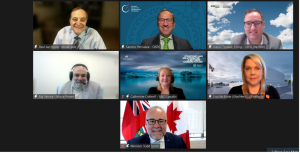This week, the Government of Ontario announced its plan to establish a Chief Science Officer position to provide input to government on high-level policy direction–the first office of its kind in Ontario’s history.
Following months of sustained advocacy by OSPE’s leadership team, staff, and member volunteers, this announcement marks another major milestone for OSPE’s recognized credibility and growing influence among provincial policy makers.
“When you look at the challenges Ontario is facing right now, whether it’s finding efficiencies to reduce hydro costs, fostering innovation, combating climate change, or countless others—status quo government won’t cut it,” says OSPE’s Chief Executive Officer, Sandro Perruzza.
“Solutions to complex policy problems require the leadership and input of professionals who understand the math, physics, and engineering involved. As the advocacy body for Ontario’s engineers, OSPE is strongly encouraged by Ontario’s recent actions to more closely consult with and involve Professional Engineers at the policymaking table—as leading practitioners of science. We applaud the government for heeding OSPE’s advice.”
The creation of the Chief Science Officer role signals Ontario’s intention to make-good on its commitment to support technically sound and evidence-based decision-making and policies.
The Chief Science Officer will, in part, be responsible for:
- Helping government make decisions on science-based policy issues;
- Championing high-quality science in government and the education system;
- Advising government on how to support future research and innovation projects;
- Promoting Ontario as a hub for research by attracting global research talent; and
- Defining the best science strategy for the province.
Ontario is Now Seeking Input on the Skills and Experience the Chief Science Officer Should Possess
“Everyone in Ontario can help decide the mandate of our province’s first Chief Science Officer. Not only is it important the search be open and transparent, but everyone should have a voice on how a Chief Science Officer would best serve the science community and Ontario.”
– The Honourable Reza Moridi, Ontario’s Minister of Research, Innovation and Science
The feedback the province receives from Ontarians and other stakeholders will inform the selection criteria used to recruit this senior government executive, and OSPE’s members have the opportunity to play a central role in shaping the selection criteria.
The successful applicant will be announced in Spring 2017.
YOU have the chance to speak up and be heard!
The province has developed four questions that Ontarians are asked to comment on by March 27. From an engineering perspective, respond to the survey and let us know what you think.
With your input, OSPE will prepare a letter to the Minister of Research, Innovation and Science conveying the recommendations from Ontario’s engineers and the engineering community. Once again, OSPE will be YOUR VOICE!
[mlw_quizmaster quiz=1]






The Chief Science Officer has to bring a data-driven, evidence-based approach to policy that is missing from current ideologically driven initiatives that run counter to the scientific realities in the province. For example, many Ontario policy documents demonstrate an ‘availability bias’ when assessing extreme weather trends and then make unfounded conclusions not supported by science – e.g., documents list a few recent big storm but ignore the statistics of real observation trends. Examples include “Facing Climate Change” where page 29 describes 2 storms and declares “Wild Weather” – in contrast the science per Engineering Climate Datasets version 2.3 by Environment and Climate Change Canada and as published in Atmosphere-Ocean in November 2014 show “no detectable trend”. Again in Connecting The Dots on Climate Data in Ontario, Toronto, January 8, 2015, The Environmental Commissioner’s Eco Climate Data Roundtable press release it is stated that “But now “1-in-100 year” storms, which are often the threshold for resilient design, are happening more frequently than in the past.” – what does the science show? Twice as many statistically significant decreasing trends in observed annual maximum rainfall at Ontario climate stations:
http://www.cityfloodmap.com/2016/04/design-standard-adaptation-vs-climate.html
And as a result the derived extreme value statistics (100 year intensities) also are going down as shown at in IDF trends:
http://www.cityfloodmap.com/2016/01/toronto-climate-change-extreme-rainfall.html
So Ontario is rich in science but poor in science policy makers who can dig past infographics and slogans (‘new weather reality’?) and interpret scientific data to guide policy.
The Chief Science Officer should be ale to align diverging ministry interests, recognizing that we practice in a world of constraints, compromise, and complexity where benefits to one realm are often disbenefits in another. Siloed ministries policies can ignore the broader perspectives. Example? MOECC’s current initiative to revert cities back to forested hydrology with low impact development measures / green infrastructure is intended to reverse water balance impacts on watersheds and restore stresses/decreasing baseflows in watercourses – but monitoring data for urban streams shows baseflows are actually increasing contrary to infographic concepts (this reality check that there are no baseflow impacts with urbanization is in fact noted in the Clean Water Act Assessment Report for Toronto approved by MOECC which notes “These overall increases to baseflow volumes are contrary to the common thought that increased impervious cover leads to reduced baseflow…” – you can’t argue with the data … we have to admit when our “science” is not explaining the issues that ideologues would predict). The hypothesis that urbanization adversely impacts baseflows is therefore rejected, so the need for expensive LID / GI retrofits is really called into question.
A Chief Science Officer should be able to guide on topics like that. And back to impacts across ministries. The Chief Science Officer should be able, with sound engineering input advise that Environment goals can adversely affect Infrastructure goals, e.g., by promoting recharge of runoff with LID / GI in dense urban areas for an expected water quality benefit will stress existing infrastructure – specifically, partially separated sanitary sewer systems that are already stressed by foundation drain wet weather extraneous flow (higher flooding risk), and recharged water and chorides from road salt will corrode the outside of iron watermains (faster pipe wall deterioration with lower resistivity of soil). So a Chief Science Officer should tie the complexities of our urban systems and watersheds together to help guide better decisions / policies.
To wrap up, the Chief Science Officer has to do what nobel prize winning economist Daniel Kahneman describes as ‘thinking slow’, taking a careful, methodical, data-drive, evidence-based approach that is in contrast to the common ‘thinking fast’ approach that we are seeing time and time again, and that misdirects the basic charactertization of the problems we need to address in Ontario. Some examples of recent “thinking fast and slow” issues that a Chief Science Officer could help overcome are here:
http://www.cityfloodmap.com/2015/11/thinking-fast-and-slow-about-extreme.html
It will be important that science-based policies are not divorced from financial realities, and that a triple bottom line approach is considered. As we have seen in the past with green energy, ideologically driver policy directions can have significant long term financial impacts to Ontarians when sound science and financial planning are not considered up front in policy development. The current low impact development / green infrastructure policy the MOECC is considering appears based on disproven scientific premises (baseflows are not decreasing in urban streams), with not regard for broader infrastructure impacts (wastewater systems and water supply), and with no regard to cost – in fact draft policy documents indicate the “excessive costs shall not be a constraint” to implementing green infrastructure to the maximum extent possible, even during a routine road shave and overlay maintenance operation. The Chief Science Officer should understand that we cannot pursue policies at all cost, as that is contrary to established environmental assessment principles in the province. To illustrate this, LID / GI retrofit costs are shown here across all Ontario municipalities considering typical retrofit costs considering urban areas (over $300 billion cost):
http://www.cityfloodmap.com/2016/11/green-infrastructure-solution-to-urban.html
And an even higher cost if we consider road retrofits outside municipalities ($376 billion cost):
http://www.cityfloodmap.com/2017/03/expensive-green-infrastructure.html
Robert Muir, P.Eng.
Toronto
I think Ontario needs both a Chief Science officer and a Chief Engineer. These are 2 very different disciplines of Study. “Scientists Study what is, Engineers create that which has never been” – Enstien.
I would like to see OSPE advocate for a Chief Engineer – someone who is licensed.
I think that Ontario needs a Chief Science Officer – and that this role is long overdue. The focus should be on implementing a scientific evidence based methodology to policy making, and to serve as a means by which the government can attract and grow policy minded engineers and scientists towards a career in the various Ministries of the Ontario government. The chief science officer can also potentially serve as an advocate to ensure that the voice of engineers and scientists in the various ministries is being heard.
A sincere thanks to each of you for taking the time to share your input. Your thoughtful suggestions and recommendations have been passed along to our advocacy team. Please stay tuned for any updates regarding OSPE’s letter to the Minister of Research, Innovation and Science.
Pingback: OSPE Dissects Federal Budget 2017 • Ontario Sociey of Professional Engineers
Pingback: Ontario Budget Marks Major Advocacy Wins for Ontario’s Engineers • Ontario Society of Professional Engineers